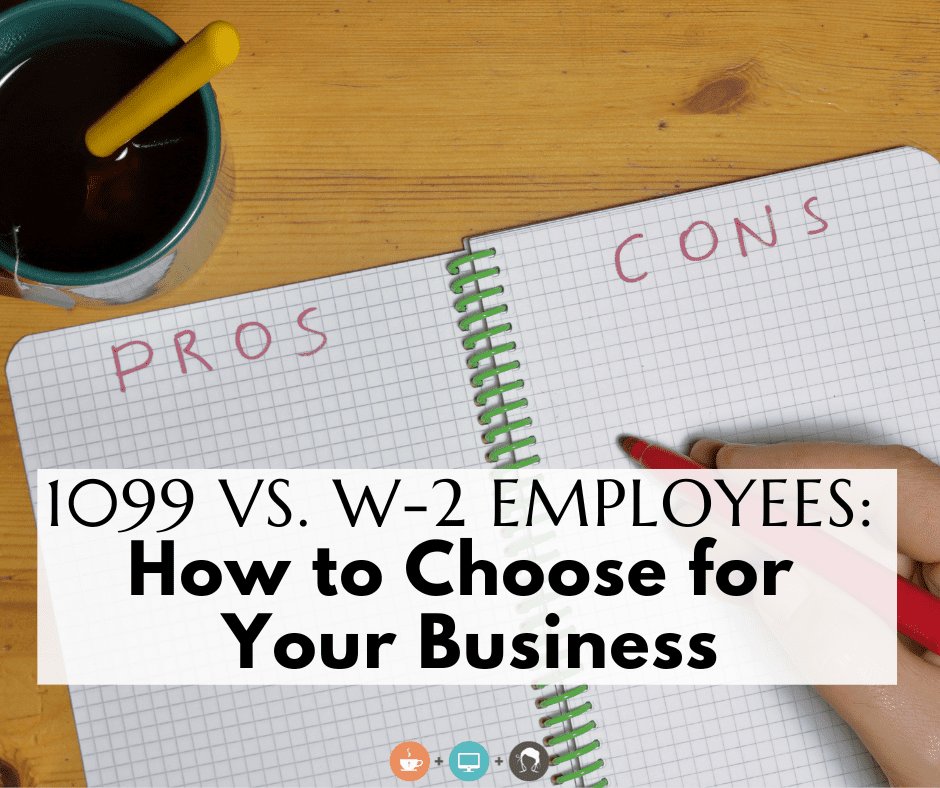
1099 vs. W-2 Employees: How to Choose for Your Business
Every business owner is responsible for deciding which category of employees to hire: W-2, or 1099 contractors. In order to find the right person for the job, however, you need to understand what each designation means and how it will impact your business and the person you’re hiring. In this post, we’ll take an in-depth look at 1099 vs. W-2 employees and help you determine which designation is best suited to your needs so that you can start bringing on new employees or contractors with confidence!
The Difference
W-2 employees are employees who work full time and receive a paycheck from the company they work for — there are cases where people work part-time as well, and their taxes, social security, and other benefits are taken care of by their employer. Employees also have access to things like health insurance and vacation time while 1099 contractors do not. Independent contractors are simply hired on to complete specific tasks or projects. Another key difference is that you can deduct expenses related to providing a service (such as software used) from your income when you work with an employee but not when you use a contractor — which means that if your business has high operating costs, it might be beneficial to consider hiring someone as an employee instead of using 1099 contractors because of the tax benefit.
The Pros and Cons
W-2 employees have a set salary and are typically eligible for benefits, such as health insurance, 401k and life insurance. A 1099 contractor can be paid by the hour or on a project basis, which means they’re responsible for their own taxes and don’t get benefits. Some businesses prefer to use 1099 contractors because they’re more flexible and can be terminated at any time without notice, while others may want the stability of a full-time employee. The decision comes down to what you need in your business at this point in time and how much work you want to put into managing payroll taxes and benefits packages.
How to Choose
When choosing between a 1099 contractor and a W-2 employee, there are many factors to consider. It’s important to know the difference between the two because you need to make sure that you follow all IRS regulations about classifying someone as either an independent contractor or an employee — failing to do so could result in heavy penalties down the road. You can find more details on the IRS website HERE that will help you learn how to classify the different types of employees.
Another factor to consider is whether you have the resources and ability to offer benefits such as medical insurance, paid time off, and retirement contributions on your own. If you don’t, then it would be more beneficial (and less costly) to hire an independent contractor who may be covered under their spouse’s plan or who can provide their own benefits.
An additional factor to consider when deciding between a 1099 contractor and a W-2 employee is what type of work they’ll be doing. If the job includes constant work that is repeated regularly, an employee is a good choice for this position because they are less likely to turn over and will be able to complete the job as scheduled. If the job includes more one-off projects, that is where a contractor can be very beneficial.
What to Include in Your Job Descriptions
Here at HireMyMom, we often see some confusion surrounding W-2 and contractor positions when listings are posted by companies. More often than not, companies forget to mention which kind of employee they are looking for, and then extra time is spent interviewing candidates that quickly realize they do not want the job because they were looking for a W-2 position OR a contractor position. We recommend mentioning up front in your job listing what you are looking for, which includes if you want someone to start as a contractor that you hope to convert to a W-2 position in the future.
Sometimes candidates are applying to multiple positions or they just miss that you mentioned that in your job description (it’s happened to all of us!). When you reach out to a potential candidate make sure to disclose again what you are looking for with regards to hours and type of position. It’s also best practice to again mention this in the interview just to make sure everyone is on the same page.
Disclaimer. The information contained in this site is provided for informational purposes only, and should not be construed as legal advice on any subject matter. You should not act or refrain from acting on the basis of any content included in this site without seeking legal or other professional advice.
